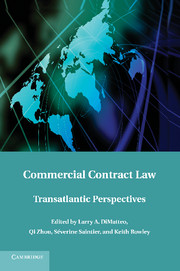Book contents
- Commercial Contract Law
- Commercial Contract Law
- Copyright page
- Dedication
- Brief Contents
- Contents
- Contributors
- Foreword
- Part I The Role of Consent
- Part II Normative Views of Contract
- Part III Contract Design and Good Faith
- Part IV Implied Terms and Interpretation
- Part V Policing Contracting Behavior
- Part VI Misrepresentation, Breach, and Remedies
- 16 Remedies for Misrepresentation
- 17 Re-Examining Damages for Fraudulent Misrepresentation
- 18 Remedies for a Documentary Breach
- 19 The Irrelevance of the Performance Interest
- Part VII Harmonizing Contract Law
- Index
17 - Re-Examining Damages for Fraudulent Misrepresentation
Towards a More Measured Response to Compensation and Deterrence
from Part VI - Misrepresentation, Breach, and Remedies
Published online by Cambridge University Press: 05 February 2013
- Commercial Contract Law
- Commercial Contract Law
- Copyright page
- Dedication
- Brief Contents
- Contents
- Contributors
- Foreword
- Part I The Role of Consent
- Part II Normative Views of Contract
- Part III Contract Design and Good Faith
- Part IV Implied Terms and Interpretation
- Part V Policing Contracting Behavior
- Part VI Misrepresentation, Breach, and Remedies
- 16 Remedies for Misrepresentation
- 17 Re-Examining Damages for Fraudulent Misrepresentation
- 18 Remedies for a Documentary Breach
- 19 The Irrelevance of the Performance Interest
- Part VII Harmonizing Contract Law
- Index
Summary
This chapter will examine the assessment of damages for fraudulent misrepresentation in England and Wales. In so doing it will explore the nature of the damages awarded in such cases, highlighting the punitive and deterrent objectives inherent in such awards. The aim of the chapter is not to argue whether or not private law is the correct forum for punishing individuals. Rather the aim is to argue that, at times, judicial attitudes toward damages for fraudulent misrepresentation are “over-zealous”; and that, if punishment is appropriate in this arena, a much more measured approach needs to be adopted. The chapter will argue that the current law can grossly over-compensate the claimant whilst punishing the defendant in a disproportionate manner. The chapter will also make suggestions for the reform of this area of law.
A policy of imposing more stringent remedies on an intentional wrongdoer serves two purposes. First it serves a deterrent purpose in discouraging fraud.... Secondly, as between the fraudster and the innocent party, moral considerations militate in favour of requiring the fraudster to bear the risk of misfortunes directly caused by his fraud. I make no apology for referring to moral considerations. The law and morality are inextricably interwoven. To a large extent the law is simply formulated and declared morality. And, as Oliver Wendell Holmes, The Common Law (ed. M. De W. Howe), p. 106, observed, the very notion of deceit with its overtones of wickedness is drawn from the moral world.
Smith New Court Securities v. Scrimgeour Vickers (1997) A.C. 254 at 282 per Lord Steyn- Type
- Chapter
- Information
- Commercial Contract LawTransatlantic Perspectives, pp. 416 - 433Publisher: Cambridge University PressPrint publication year: 2013



